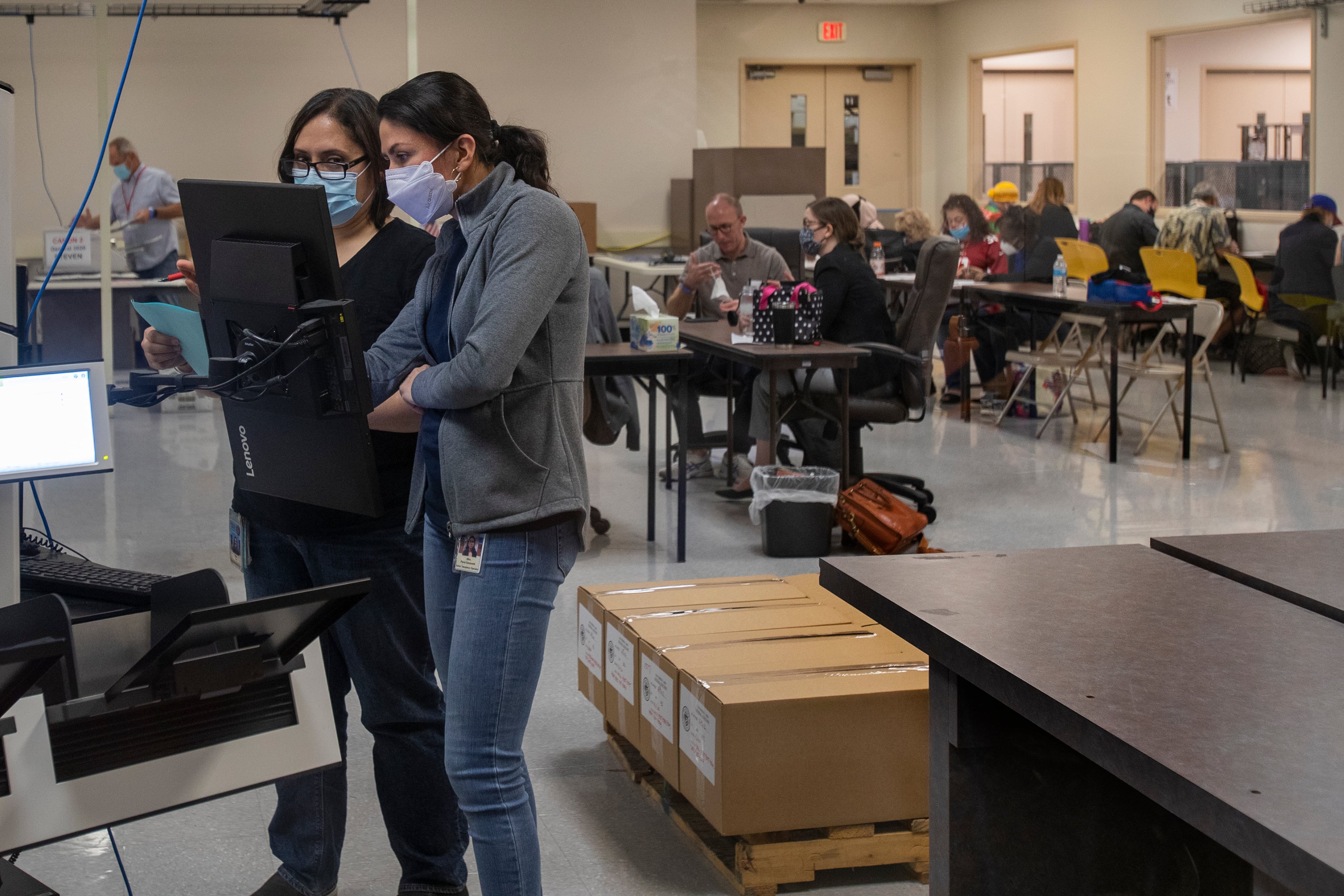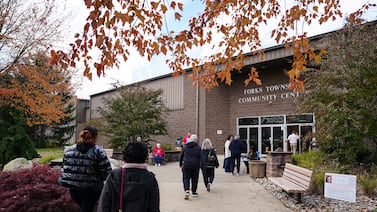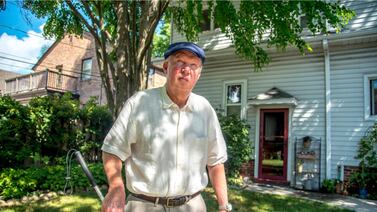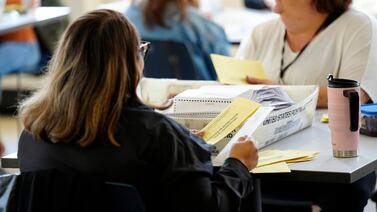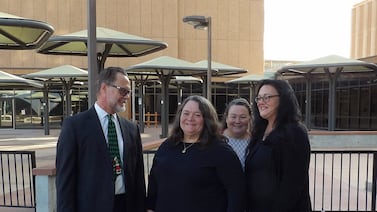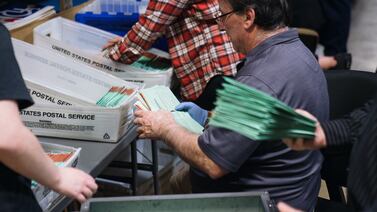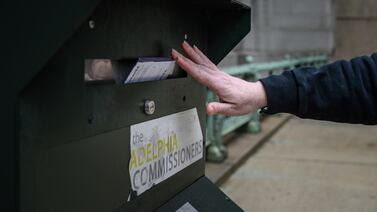The Republican National Committee is telling potential Arizona polling place observers that there are “festering problems” in how elections are run, such as security issues with vote-counting machines and problems with voter rolls, as it trains them for the state’s upcoming primary election.
The RNC training delivers the message that the “2020 election had serious problems,” worrying experienced former election officials and lawyers who have trained observers in the past and who say the point of training should be simply to encourage observers to watch for violations of law at the polls without disturbing the peace.
Republican Maricopa County Supervisor Bill Gates, who as an attorney led Republican observer training in the 2000s, said the messaging concerns him because his focus was always on providing a straightforward picture of what was legal and what was not at the polls.
“It’s not about kind of ginning people up, which is what that sounds like,” Gates said. “That’s the narrative, though.”
Votebeat watched an RNC Zoom training at the invitation of an attendee, and separately received information about an in-person training from an attendee, after an RNC spokesperson said that reporters were not allowed to attend.
Asked about the intention of the messaging, Ben Petersen, the RNC Arizona communications director, said that the committee’s staff and volunteer training “emphasizes the need to comply with federal and state laws protecting voting rights.”
“Any individual participating in our election integrity program who does not follow the law will be promptly dismissed,” Petersen said.
The idea that Republicans who don’t believe the 2020 election was fair — a majority in the country, according to a poll late last year — could try to disrupt in-person voting during the Aug. 2 primary is causing election officials across the state and around the country to make changes to protect from internal threats. During California’s primary earlier this month, election officials in Shasta County said observers tried to intimidate them during the vote count.
As of 2021, Maricopa County began requiring polling place observers to fill out forms detailing any problems before leaving the polls, a way to avoid unsupported allegations surfacing after the fact. Yavapai County is also doing that, as well as restricting where observers can go within polling places and ensuring that each location has experienced and bipartisan staff prepared to handle any problems.
In response, the Arizona Republican Party says it is concerned that election officials may be attempting to unfairly limit Republican volunteers’ access to the polls. The RNC is asking election officials to provide specific details about hiring practices for poll workers, which are hired and trained by the counties and are separate from poll observers selected by the political parties.
Republican lawyers say it would be unfair, and perhaps even unlawful, for election officials to block workers and observers from the polls just because they believe that the 2020 election was stolen or that widespread voting fraud exists.
Plus, any attempts to limit skeptical workers might backfire, said Republican attorney Kory Langhofer, who represented the Trump campaign in 2020 court challenges in Arizona.
“If your goal is to convince people the election is fair then you want both parties, including people who believe they have been unfair in the past, to participate,” he said. “If you start to not hire those people, that’s a great way to make sure everyone is paranoid about the elections.”
Republican interest in working and observing surges
County election officials across the state say they are hearing from more Republicans who want to work as poll workers or volunteer as poll observers in the upcoming primary.
In Yavapai County in central Arizona, which includes Prescott, the GOP sent a list of potential poll workers to the elections department for the first time in at least 30 years, according to Matt Mortellaro, the county’s elections database programmer.
Arizona election officials are also hearing more directly from county Republican Party officials.
As first reported by the Arizona Agenda, Cochise County Republican Party chair Robert Montgomery messaged elections director Lisa Marra and requested that at least 50% of poll workers be Republican.
She responded to him telling him that isn’t required under state law. “I get that,” he responded, but if Republican workers were to be outnumbered by Democrats, “there will be rage and massive distrust.”
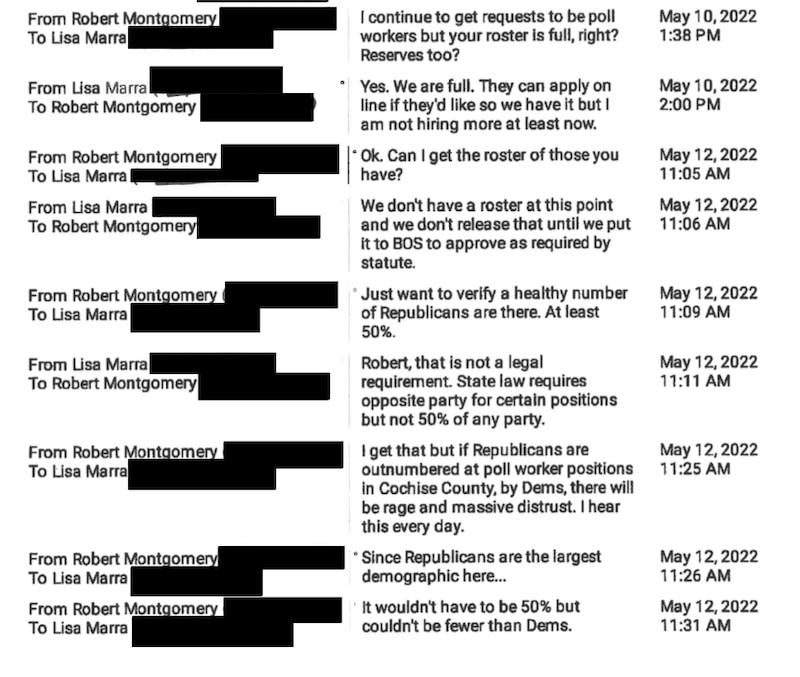
Arizona law says the top two officials in charge of each polling place cannot be from the same political party. But it doesn’t require all polling place workers to be evenly split between Republicans and Democrats, and in many counties, there are also third parties entitled to some representation.
Chris DeRose, a Republican lawyer who previously trained Republican observers, said the high interest is fascinating, considering for decades it’s been difficult to get Republicans to work as poll workers or volunteer as observers.
Gates said it was always a struggle to get people involved, and the party was never able to assign volunteers to cover every polling place.
State law allows for one observer from each party at each polling place, but Gates said it was always very rare to see someone from another party at the polling place where you went to observe. It’s a boring job, DeRose said, and the problems that come up are almost always small mishaps, such as unintentional mistakes by poll workers or one-off issues with machines.
There’s also never been this much controversy drawing people in.
The growing number of Republicans interested in watching over the polls coincides with the lifting of a legal restriction that stopped the RNC from training poll observers for decades.
In 1982, amid accusations of voter suppression targeting communities of color, the party was placed under a consent decree that barred it from challenging voter eligibility at polling places. That largely forced the RNC to leave such work to state parties and allied local organizations.
In Arizona, for example, the consent decree meant there wasn’t a formalized process for training Republican observers until the early 2000s, according to several Republican lawyers.
Gates helped the party establish formal observer trainings and procedures starting in 2002, via a group called the Arizona Republican Lawyers Association, before he was a supervisor and before he was appointed to the Phoenix City Council in 2009.
He said that typically meant getting a number of Republican lawyers set up on Election Day to take calls from observers about polling place issues on an Election Day hotline.
A judge lifted the RNC consent decree in 2018, and in 2020 the RNC was back in the observing game. Led by the Trump campaign, the party recruited thousands of poll observers across the country. Headlines warned of disruption at the polls, but those worries mostly did not play out.
Following Election Day, though, Republican observers made a spectacle in Pennsylvania and Michigan, claiming they were unable to properly witness ballot counting. The Pennsylvania Supreme Court ruled that observers had proper access there. In Michigan, reporters and state officials said Republican observers were given appropriate access.
In the end, the party’s thousands of observers across the country were not able to convince any courts of their allegations of widespread fraud or illegal activity.
Now, the RNC has made a “multi-million-dollar investment” for the 2022 cycle that includes 16 state election integrity directors, 26 in-state election integrity counsels and thousands of poll workers and observers, Petersen said.
The process for recruiting poll observers and hiring poll workers varies by state, though the GOP’s Petersen notes states typically require a credential from the state or local party or a candidate in order to serve as a poll observer. In some states, political parties can give local election officials the names of potential poll workers.
In Arizona this year, the RNC is trying to recruit 5,000 poll workers and observers for the primary and general elections, according to a party website promoting the trainings, though poll workers must also be hired and trained by local election officials.
The RNC’s trainings are being led by Tony Sanchez, who introduced himself at a recent training held over Zoom as the state party’s election integrity director. The intention is to build a “grassroots army” of election workers and observers in 2020, Sanchez said.
“Democrats have had a monopoly on poll watching for 40 years, and it speaks volumes that they’re terrified of an even playing field,” Petersen told attendees. “Since the start of this cycle, the RNC has successfully executed our election integrity operation in states that have already held elections like Ohio, Georgia, Wisconsin, Pennsylvania, Texas, Virginia, New Jersey, and others. In all instances, we had 100% coverage at all key polling locations, elections have run smoothly, and turnout has increased.”
The Arizona Democratic Party is also recruiting and training poll workers and poll observers for the upcoming elections through what it calls its voter protection program, said Morgan Dick, the party’s Arizona communications director. The party is hosting trainings in person and virtually in June and July, she said, and described them as “well attended” so far.
Dick said the party’s primary goal is “to ensure that every Arizonan can confidently cast their ballot by mail or in person during the midterm elections.”
Republicans are also partnering with several groups for “election integrity” trainings, according to the website, including America Pack, EZAZ, the Tea Party Patriots, and Turning Point Action. Trainings by third-party groups have been drawing attention elsewhere.
The RNC’s Petersen said the party is working with outside groups but insisted, “The party’s efforts are independent from any outside organization. As such, the RNC is not a part of any formal coalition with outside groups.”
Petersen noted that outside groups often direct attendees of their training to submit their names for poll observer or poll worker positions through the party, which, he says, “is why our state election integrity directors attend events put together by outside organizations.”
EZAZ, a local voter advocacy group on the list of partner organizations included on the Republican party website, is partnering with conservative advocacy group FreedomWorks to host election integrity trainings this year. Peter Vicenzi, a spokesperson for FreedomWorks, said they saw a need to get more active in this realm, where he said Democratic groups have been active for years.
“Republicans deserve to be part of the process too,” Vicenzi said.
The groups partnering for the election integrity trainings in Arizona are making a big recruitment push to go along with the trainings – one that is sure to get the party a wider reach for email marketing – and therefore expand its fundraising abilities.
A text message sent to some Republican voters earlier this month had a Donald Trump caricature dressed and pointing like Uncle Sam with “I want you to be a poll observer,” written underneath. It directed recipients to the state Republican Party’s website for the trainings and told them to enter their information.
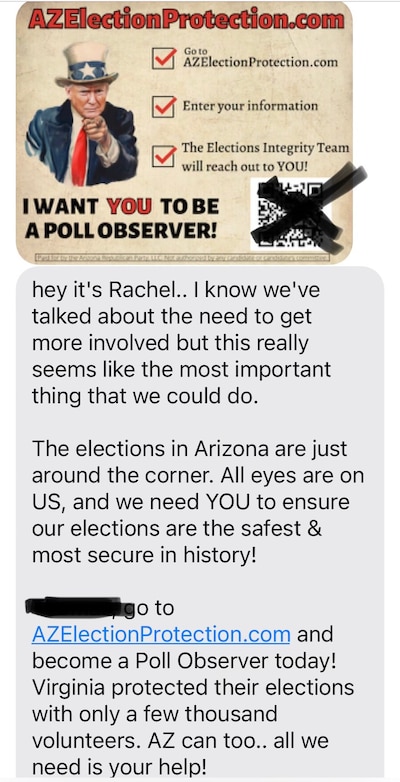
“The elections in Arizona are just around the corner,” the accompanying message read, “All eyes are on US, and we need YOU to ensure our elections are the safest & most secure in history!”
An email the state party sent to its list on June 20 also directed supporters to the election integrity website — and suggested making a “grassroots contribution” to support “fighters in the Grand Canyon State who don’t look the other way.”
Training tells attendees 2020 election “uncovered festering problems”
The Republican National Committee has so far been hosting the Arizona election integrity trainings for observers, with a national schedule on www.gopvictory.com, across Maricopa County and on Zoom since at least April.
For the most part, the trainings are straightforward: They discuss the party’s goals (to increase Republican participation as poll workers and watchers and ensure the upcoming elections are fair) and what the role of an observer is (to ensure election laws are followed at polling places).
One section of the training, in particular, reminds attendees a list of don’ts: don’t be disrespectful, don’t be demanding, don’t interfere or disrupt voting. Another section talks about potential problems to watch for that are relatively straightforward under Arizona law, such as late openings of polling places and long lines.
But in the Zoom training Sanchez also said the 2020 election had “serious problems” even though experts and election officials have repeatedly said it was actually one of the smoothest modern elections in history.
Sanchez said laws were disregarded and many questions are still left unanswered, even though Arizona courts found otherwise.
He told attendees the election “uncovered festering problems,” and said that there are security issues with vote-counting machines. Multiple pre- and post-election audits, done by Maricopa County and contractors the county hired, found that machines counted votes accurately and were not connected to the internet.
DeRose, Gates, and Langhofer all said that the focus of the trainings in the past was always on what was allowed under the law and what wasn’t.
Gates said he believes some of the statements in the RNC training are political, something he always tried to avoid.
“My slides would have said something like the right to vote is fundamental,” Gates said. “And we want to make sure every eligible vote is counted.”
Tammy Patrick, who helped both political parties in Maricopa County train observers for years when she was the county’s compliance officer, called the RNC’s messaging “deeply problematic” because it primes observers to come in believing there are massive problems with the system.
“If you are pre-positioning the observers that there is all this criminal activity they need to uncover, they are going to view what they are seeing from a completely skewed viewpoint,” she said.
Patrick said the intentions of these new poll observers worries her. “They think they are going to find the body,” she said.
DeRose said he didn’t see any major problems with the messaging in the training. But he also said that, when he led the trainings, he tried to screen people who he thought were there with ill intentions.
“I had this guy show up in 2009 with a ‘Don’t Tread on Me’ shirt,” DeRose said of his time training Republican observers in Virginia. The volunteer insisted on being able to wear the shirt while observing inside the polling place.* “This guy is just going to be trouble. We aren’t going to credential him.”
Langhofer, the Republican attorney who represented the Trump campaign and has also represented Arizona Senate Republicans in their battles over Maricopa County’s ballot review, said the number one thing that is important to do in the training is to “make sure people aren’t overzealous.” Langhofer has been involved in Republican trainings for poll observers since 2012.
“Most people who volunteer to be involved in early voting and election day are very sincere, citizens who just want to help the system run well,” Langhofer said. “But some small percentage of people are overzealous, or emotional, and can be disruptive.”
He said it’s important to train observers to raise problems internally through election officials and “not in some confrontational way inside a polling place or involving voters.”
Election officials respond with rules for observers
With the increased interest and recruitment, Mortellaro in Yavapai County said that the county added a number of new procedures this year for observers for the upcoming elections because “we are a little concerned about them disrupting things this election.”
“We are trying to put procedures in place that would block that before they happened.”
This includes emphasizing that observers are only able to talk to the inspector of the polling place, and never voters, and placing observers in particular spots in vote centers where they are unable to cause a disruption.
Mortellaro said those restrictions would vary by polling place, but generally the county doesn’t want observers near the line of people being checked in, as “that’s a great opportunity for them to talk politics to people in the line.” The county also doesn’t want them where they can look over voters’ shoulders while they are filling out their ballots, and doesn’t want them near voter check-in stations.
“We have to be worried about people messing around with machines,” he said.
Observers will also be required to fill out a form they hand in before they leave that lists any problems they saw that day. If they didn’t see any, they have to write “N/A.”
County Recorder Leslie Hoffman said county officials are hopeful that will prevent people from hearing election fraud claims elsewhere after they leave and then claiming the same problems also happened at their polling place.
“We want to make them accountable,” Hoffman said. “If there is something wrong, we want to make sure we address it. Or, if not, we want to know that too.”
The county got the idea for the form from Maricopa County. Generally, Mortellaro said, county recorders are sharing ideas for ways to prevent disruption in polling places this year.
At the same time, the Arizona Republican Party is concerned that Republicans workers and watchers will be kept from the polls.
Kelli Ward, who chairs the state GOP, tweeted on May 12 that she was “told that Election Departments around Arizona are requiring illegal ‘ideological tests’ of poll workers and that they are actively discriminating against #AmericaFirst Republican applicants.”
A public records request first reported by Arizona Agenda that was filed by attorney Eric Spencer on behalf of the RNC to at least Cochise County – the party didn’t respond to questions about where else they submitted requests – asked election officials to provide documents about party poll observer access and the poll worker hiring process.
This included a request for any documents “describing any limitations to serving as a poll worker or otherwise temporary worker based on political views,” with examples such as “reviewing a prospective worker’s social media” and “making worker assignments based (in whole or in part) on political views.”
Asked about the requests, Petersen, the RNC spokesman, said public records requests related to election administration issues are “nothing unusual and various groups on both sides of the aisle do the same.”
Votebeat did not find any evidence that election officials were unfairly or illegally screening poll workers. But a few election officials did say that, in recent years, it’s become important to watch for red flags when screening workers that could indicate they intend to disrupt or fail to follow applicable laws in the polling place.
Yavapai County, which is hiring about 300 poll workers for the upcoming primary, started interviewing all poll workers for the first time this year, instead of letting the leader at each polling place, the inspector, choose their team. This is to ensure the county has more control over the makeup of workers in each location, Mortellaro said, “to make sure we are getting the kind of people we want.”
Mortellaro said the county doesn’t directly ask for opinions about the fairness of elections during the interview, but sometimes candidates bring up politics.
Hoffman, the county recorder, said an example of a potential issue is a poll worker candidate who, when told they can’t wear political clothes in a polling place — something against the law in Arizona — gets upset about it.
Asked what might prevent them from hiring someone, Hoffman said that might be someone saying, “I want to make sure things are done right — I’m really going to be watching everybody.’”
“At that point, take the training to be an observer instead,” Hoffman said, “Because that’s what they do. If you’re a poll worker, you need to do your job.”
Marra, who is hiring about 250 poll workers for the upcoming primary, said the county asks poll worker applicants to fill out an online questionnaire, which includes a question about why they want to be a poll worker.
Some applications stood out to Marra this year because they said they had never been a poll worker before but wanted to make sure the election was fair. She said she doesn’t see that as harmful, but said there are certain things that would cause concern, such as someone saying something specific about wanting to damage equipment.
She’s also started including more information in trainings about voter intimidation and harassment.
Patrick, the former Maricopa County elections compliance officer, who is now a senior advisor of elections at the nonprofit nonpartisan Democracy Fund, said she doubts election officials would excessively screen election workers, simply because it’s so hard to find enough workers in the first place.
She said it’s important for election directors to ensure that they have experienced workers at each polling place, to balance the numbers of workers by political affiliation, to increase the number of workers roaming polling places for issues, and to review their hotline and communication strategy.
Nonetheless, Republicans are worried their volunteers will be improperly kept out. Langhofer said election officials shouldn’t be disqualifying workers based on their beliefs about the 2020 election, and he believes any discrimination based on political beliefs would be illegal. He also said it’s not a “fringe position” to have concerns about the fairness of the 2020 election.
“This is a common view in American politics,” he said. “You can’t be excluding mainstream views.”
DeRose also said he would be concerned with any attempt to screen poll workers on their beliefs of fairness in the election.
“Who is asking the questions, who is designing them, and who is making the decision?” DeRose said. “That, to me, could be rife with problems. Our system already contemplates that people are going to have views.”
DeRose said, for him, the line would be if someone said they wanted to disrupt the election.
He said that people who think there are problems with how elections are run should work at polling places and see how mundane the process is.
“Come spend the day in the polling place,” he said, “and try to stay awake.”
*Clarification, June 27, 2022: This article was updated to clarify that a volunteer Chris DeRose trained in Virginia insisted on wearing his “Don’t tread on me” shirt inside a polling place.
Freelance reporter Rachel Leingang contributed to this article.
Jen Fifield is a reporter for Votebeat based in Arizona. Contact Jen at jfifield@votebeat.org.


